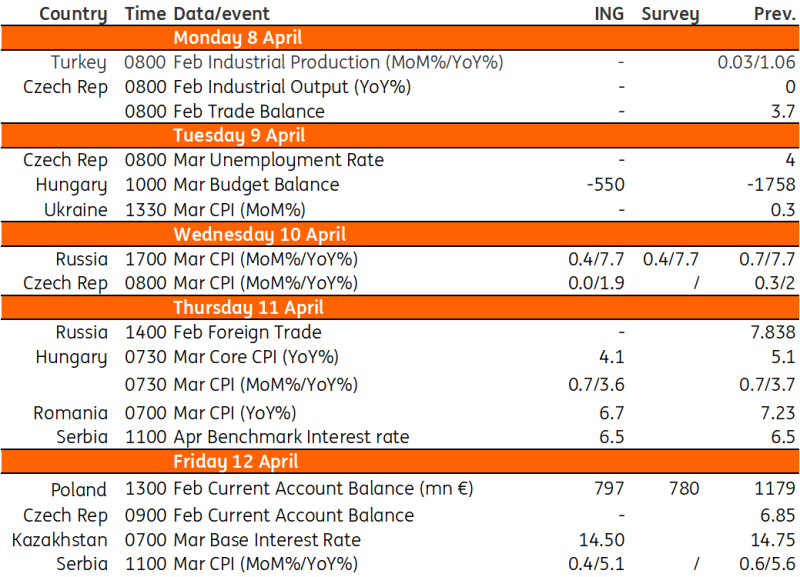
Image Source: Pixabay
Poland’s current account surplus and Hungarian inflation figures are set to be the key highlights in a quieter week ahead in the EMEA region.
Poland: Current account surplus from strong trade in goods
Current account (Feb): €797m
We forecast a €797m surplus for Poland's current account in February 2024, but it will be smaller than in February 2023 (€147m) amid a deterioration in the foreign income balance. As a result, the cumulative 12-month current account surplus will narrow to 1.3% of GDP, down from 1.4% of GDP after January this year. Still, we expect a solid surplus in trade in goods, and we hope to see positive annual dynamics for both exports and imports.
Nevertheless, net exports are projected to contribute negatively to economic growth in 2024; the anticipated rebound in imports is expected to be stronger than the improvements seen in exports. The former will be fuelled by surging domestic demand and buoyant consumption, while the latter is likely to be curbed by weak external demand, particularly from Germany.
Hungary: March inflation to decelerate to 3.6%
In Hungary, we will see the latest budget figures for March as well as the March inflation print. On the fiscal side, we expect another monthly deficit but a much more consolidated figure than in the previous month. Some one-off burdens on the expenditure side will be taken off the books, and the revenue side is expected to improve as domestic demand slowly but surely strengthens. On the price side, we see another strong monthly repricing, with the third 0.7% print in a row.
Services will remain the main driver of monthly inflation, especially holiday packages and telecommunications services. On top of that, further increases in fuel prices will also add to inflationary pressure. Looking at the year-on-year rate, we see a further slight deceleration to 3.6% due to the still relatively high base. The lion's share of annual price increases (around 70%) will come from services inflation. The slight deceleration is the result of opposing forces, with fuel and household energy prices contributing positively to the change from February to March, while a change in food, alcoholic beverages and tobacco prices will weigh on the year-on-year reading.
Key events in EMEA next week

Refinitiv, ING
More By This Author:
FX Daily: Clues Vs. Evidence Philippine Inflation Moves Higher As Rice Stays Pricey Rates Spark: Rolling The Payrolls Dice
Disclaimer: This publication has been prepared by the Economic and Financial Analysis Division of ING Bank N.V. (“ING”) solely for information purposes without regard to any ...
more
Disclaimer: This publication has been prepared by the Economic and Financial Analysis Division of ING Bank N.V. (“ING”) solely for information purposes without regard to any particular user's investment objectives, financial situation, or means. ING forms part of ING Group (being for this purpose ING Group NV and its subsidiary and affiliated companies). The information in the publication is not an investment recommendation and it is not investment, legal or tax advice or an offer or solicitation to purchase or sell any financial instrument. Reasonable care has been taken to ensure that this publication is not untrue or misleading when published, but ING does not represent that it is accurate or complete. ING does not accept any liability for any direct, indirect or consequential loss arising from any use of this publication. Unless otherwise stated, any views, forecasts, or estimates are solely those of the author(s), as of the date of the publication and are subject to change without notice.
The distribution of this publication may be restricted by law or regulation in different jurisdictions and persons into whose possession this publication comes should inform themselves about, and observe, such restrictions.
Copyright and database rights protection exists in this report and it may not be reproduced, distributed or published by any person for any purpose without the prior express consent of ING. All rights are reserved. ING Bank N.V. is authorised by the Dutch Central Bank and supervised by the European Central Bank (ECB), the Dutch Central Bank (DNB) and the Dutch Authority for the Financial Markets (AFM). ING Bank N.V. is incorporated in the Netherlands (Trade Register no. 33031431 Amsterdam). In the United Kingdom this information is approved and/or communicated by ING Bank N.V., London Branch. ING Bank N.V., London Branch is deemed authorised by the Prudential Regulation Authority and is subject to regulation by the Financial Conduct Authority and limited regulation by the Prudential Regulation Authority. The nature and extent of consumer protections may differ from those for firms based in the UK. Details of the Temporary Permissions Regime, which allows EEA-based firms to operate in the UK for a limited period while seeking full authorisation, are available on the Financial Conduct Authority’s website.. ING Bank N.V., London branch is registered in England (Registration number BR000341) at 8-10 Moorgate, London EC2 6DA. For US Investors: Any person wishing to discuss this report or effect transactions in any security discussed herein should contact ING Financial Markets LLC, which is a member of the NYSE, FINRA and SIPC and part of ING, and which has accepted responsibility for the distribution of this report in the United States under applicable requirements.
less
How did you like this article? Let us know so we can better customize your reading experience.





